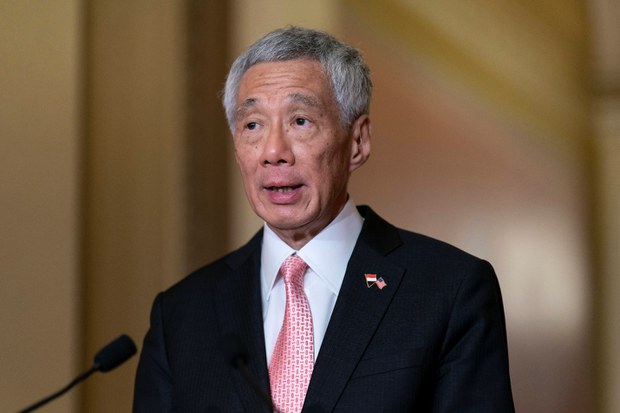Singapore PM: Russian invasion of Ukraine creates sense of insecurity in Asia-Pacific
2022.03.30
Washington
 Prime Minister Lee Hsien Loong of Singapore makes remarks as he arrives for talks with House Speaker Nancy Pelosi at the U.S. Capitol in Washington, March 30, 2022.
Prime Minister Lee Hsien Loong of Singapore makes remarks as he arrives for talks with House Speaker Nancy Pelosi at the U.S. Capitol in Washington, March 30, 2022.
In upending the international order Russia’s invasion of Ukraine has strained Sino-American ties and created a sense of insecurity in the Indo-Pacific region, Singapore’s leader told a Washington think-tank during a visit to the U.S. capital on Wednesday.
In a one-hour webinar hosted by the Council on Foreign Relations, Prime Minister Lee Hsien Loong discussed China’s relationship with Russia as it affects the Indo-Pacific, along with U.S. efforts to work with Singapore and its neighbors in Southeast Asia.
Moderator Richard Haass opened the event by asking Lee to comment on China’s relationships in light of the Russian attack on Ukraine.
“What happens in Ukraine is bound to have a big impact on U.S.-China relations. It has already strained them,” Lee said.
“It has damaged the international framework and peace between countries,” he said. “Some of us are going to feel very insecure in the Asia-Pacific.”
Lee said he hoped the relationship between the superpowers would hold.
The Ukraine invasion, which began on Feb. 24, had also affected Beijing’s relationship with Moscow, he said.
“It presents them with awkward questions because on Ukraine it violates the principles which the Chinese hold very dearly – territorial integrity, sovereignty and non-interference,” Lee said. Still, “I don’t think in the region the fact that China refuses to distance itself from Russia cost them.”
During the 2022 Winter Olympics that Beijing hosted in the days before the invasion, Russia and China agreed to a cooperation pact. And since Russian President Vladimir Putin ordered his military forces to invade Ukraine, fears have trickled over into Asia and elsewhere about whether that action might inspire Chinese President Xi Jinping to launch an attack on Taiwan.
The Singapore prime minister also talked about the South China Sea in terms of the Association of Southeast Asian Nations (ASEAN) relationship with China. He touched on but did not go into detail about China’s overlapping waterway claims with four members of the Southeast Asian bloc.
China claims nearly all of the South China Sea while ASEAN members Brunei, Malaysia, the Philippines and Vietnam have their own claims to parts of the sea. Member-state Indonesia is locked in a separate dispute with China which claims parts of the sea that are within Jakarta’s exclusive economic zone.
“Different countries have different atolls or islands that are occupied. Some have been reclaimed, enlarged and occupied,” Lee said.
The Philippines has protested China’s presence around the Scarborough Shoal in the waterway, filing a series of diplomatic protests. The most recent one, filed earlier this week, raised alarm about a China Coast Guard ship coming within 21 meters (69 feet) of a Philippine Coast Guard ship on March 2.
“From our point of view, freedom of navigation is important, international law is important, the U.N. Convention on the Law of the Sea [UNCLOS] is also important, and peaceful resolution of disputes so you avoid some accidental conflicts,” Lee said.
China and ASEAN have been working on establishing a code of conduct for the South China Sea but have not been able to reach agreement, he noted.
Lee made the comment a day after he met with President Joe Biden at the White House, where they voiced their support for freedom of navigation.
“We reaffirm that all concerned parties must abide by the 2002 Declaration on the Conduct of Parties in the South China Sea, and reiterate our support for ASEAN-led efforts to develop an effective and substantive Code of Conduct for the South China Sea that upholds the legitimate rights and interests of all parties and is consistent with UNCLOS,” Biden and Lee said in a joint statement.
It also said the leaders “respect states’ ability to conserve, sustainably develop, and effectively manage their maritime natural resources in accordance with international law, including UNCLOS.”
Economic relations
Another question raised at Wednesday’s webinar dealt with U.S. economic relationships in the region. Lee discussed the Indo-Pacific Economic Framework proposed by Biden in October 2021.
“What it should do is to be a positive agenda for the U.S. on economic cooperation with countries in Asia Pacific,” Lee said, adding it should have an “upside for both parties.”
“Let’s take some baby steps toward market access and trade levelization,” he said. “Politics is the art of the possible.”
Asked about the Trans-Pacific Partnership – a proposed 12-nation plan that collapsed in 2017 when then-President Donald Trump withdrew, “that’s water under the bridge.”
The TPP, which became the Comprehensive and Progressive Agreement for Trans-Pacific Partnership (CPTPP) without the U.S. joining, went into effect in 2018. China has sought membership in the partnership.







